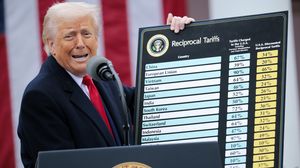By Shefali Luthra, Mel Leonor Barclay. Originally published by The 19th
President Joe Biden’s decision to not seek a second term — and his endorsement of Vice President Kamala Harris to replace him — gives Democrats the opportunity to elevate an eager and consistent messenger on abortion rights heading into the first presidential election since the fall of Roe v. Wade.
Harris had already become the administration’s leading voice on the importance of abortion rights, one of the Democratic Party’s top issues, at the federal and state level. She has spent the last year using rallies and interviews to make a clear-eyed case to voters on how a second Donald Trump presidency and Republican majorities in Congress could restrict abortion access.
While Biden said he offered Harris his “full support,” the decision will be up to delegates at the party’s national convention next month. Some Democratic leaders, including former House Speaker Nancy Pelosi, have said they would support an open process to determine who the party’s nominee will be.
Harris’ nomination would present a stark departure from Biden, who anchored his reelection campaign on abortion but who at times struggled to articulate his party’s view that it is an essential right for women. Biden, a devout Roman Catholic, evolved his position on the issue over five decades in office, going from opposing most abortions to running for reelection on restoring federal protections for abortion under the framework of Roe v. Wade.
Democrats’ ability to energize and persuade voters on the issue will be a decisive factor in an election that is only 107 days away. Abortion rights’ popularity with voters has made the issue an albatross for Republicans, costing them victories up and down the ballot over the past two years. The party appears to be trying to neutralize the issue by drawing voters’ attention away from it, as illustrated by the Republican National Convention last week, where just two low-profile speakers mentioned abortion. Neither Trump nor his running mate, JD Vance, nor any of the elected Republicans there, nor any Republican running for office made a passing nod to abortion, though Vance has previously voiced support for a national ban on the procedure.
The Republican National Committee’s platform, which the party quietly approved before its convention in Milwaukee last week, makes no mention of a national abortion ban, despite endorsing a legal theory that could give fetuses the same rights as people. Meanwhile, Project 2025, a conservative policy wishlist written by a group that includes former Trump staffers, argues that if Republicans take the White House, they should leverage federal offices such as the Food and Drug Administration and the Department of Justice to curb abortion access nationwide.
A growing share of Americans say a candidate’s stance on abortion will be critical in how they vote. Polling from KFF, a nonpartisan health research organization, found that 12 percent of voters said abortion was the most important issue shaping their vote; an additional 52 percent said it was “very important” though not their top issue. Most voters who prioritize abortion say they support access to the procedure, KFF found. A survey from the Pew Research Center found that almost two-thirds of Americans believe abortion should be legal in most or all cases.
The Democratic Party at large has already made abortion a central campaign issue, relying largely on the stories of women who have sought abortions.
Harris’ status as a top contender for the nomination would make her one of the most vocally pro-abortion-rights candidates ever nominated by a major political party, just as the nation enters its first presidential election since the 2022 overturn of Roe v. Wade, which allowed states to ban the procedure.
“If we, in this year of our Lord 2024, have a state of being where the government can tell you what to do with your body — I mean, the most basic of things you should have control over — everybody better watch out about what other freedoms you’re taking for granted,” Harris said at a campaign event last week in Michigan.
Biden stumbled over a question on the issue during June 27th’s presidential debate and has drawn criticism from some abortion rights supporters, who note his infrequent use of the actual word “abortion.”
Though he promised as president to sign any legislation that would codify federal abortion rights, Biden is also known to be less comfortable with abortion itself, and as a young senator argued that Roe v. Wade went “too far.”
“Harris always had a track record of caring about the issue in the White House,” Mary Ziegler, an abortion historian at the University of California Davis, recently told The 19th. “She took on that role to be the voice of that issue and was much more comfortable and outspoken on issues related to abortion than Biden was.”



















































































